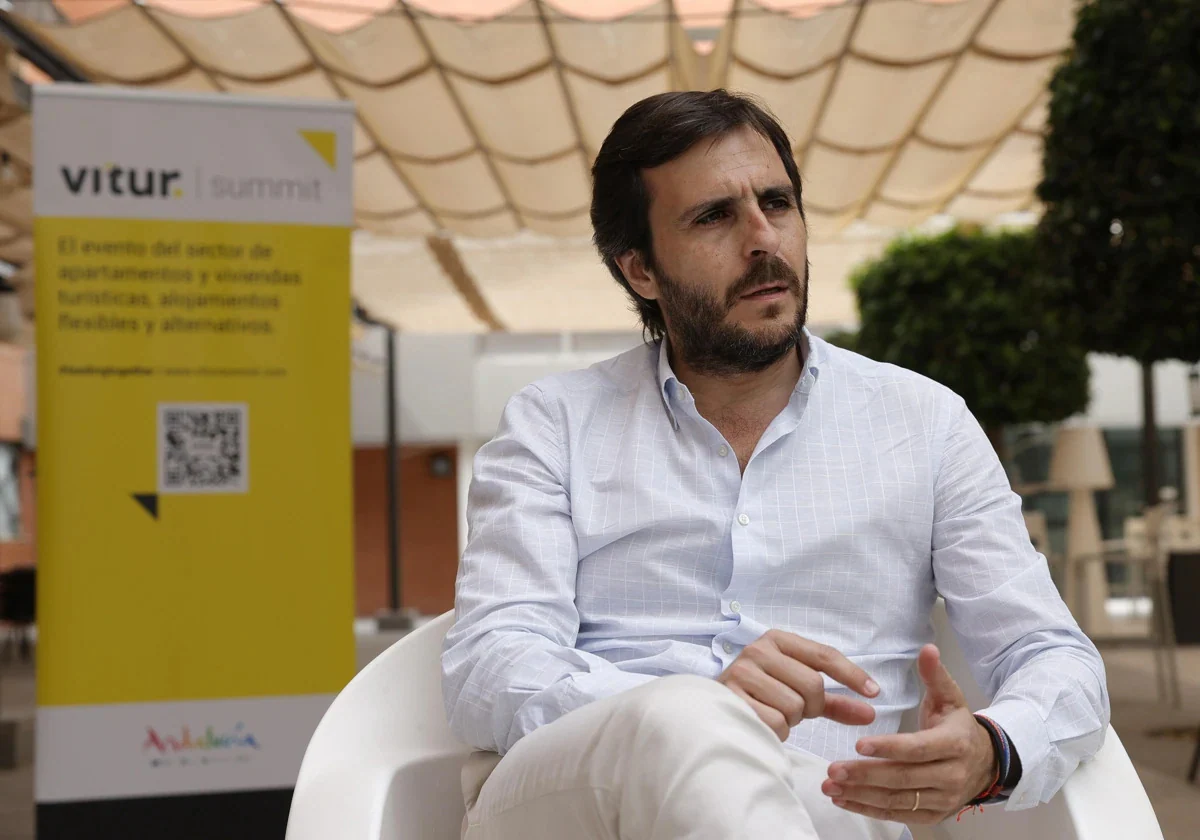Andalusian president of sector: '42% of tourists only want to book a rental property for their holidays'
Ahead of a conference involving 700 tourism experts on the Costa del Sol, Carlos Pérez-Lanzac warned of the risks of excessive regulation in the sector and said further limits could deter tourists
Amid protests against mass tourism and calls for tighter limitations on holiday homes, the president of the Andalusian Tourist Housing Association (AVVA-Pro), Carlos Pérez-Lanzac, warned, hours before the start of the Vitur Summit, against excessive regulations. He pointed out 42% of the demand of visitors is exclusively for holiday homes.
Vitur Summit comes amid controversy over the growth of holiday homes. What do you propose in the face of this protest against holiday rentals?
I think that there is excessive pressure from the hotel sector and that it is having a significant danger because it ends up demonising the tourist. We are at a rather delicate moment because tourists do not wear a sign on their foreheads saying whether I am staying in a hotel or in a tourist flat. What is being created is precisely this tourism phobia that, for example, in the case of Barcelona, we are talking about a 57% reduction in tourist accommodation between 2019 and 2023, and yet the price of housing has increased by 20%, and the average hotel price has increased by 18% and the profit per available hotel room has fallen by 0.3%. So, tell me what impact or what use these restrictive measures have. We are one click away from losing that tourist and that tourist flow.
How do you perceive this situation in Andalucía?
Andalucía has no other comparable or replaceable industry like tourism. The data we have is that there is still room for absorbing visitors, because in Spain we have a ratio of 1.6 tourists per resident and in Andalucía we are still at 1.4. In other words, we are saying that Spain still has the capacity to carry and absorb tourists. As the minister of tourism said, what we have is a gift from our parents and a loan for our children. In other words, we have to prepare the tourism model that we are going to leave for the future. We must now plan the management of success.
Is this success management late?
Absolutely. We are a little behind in destinations such as Malaga, which is experiencing a higher rate of demand than the supply is able to cope with.
What are the figures for this success in tourist housing?
We have had more than seven million overnight stays in the first half of last year alone, according to Eurostat. Spain is the second largest holiday rental destination in Europe, after France and followed by Croatia. Last year we were third in Europe with ten million overnight stays. At Vitur Summit we are going to present the full balance for 2023, but we are also talking about one of the top three destinations for our type of accommodation, which is the fastest growing because it is the one that is most in demand in the market. That is why this demonisation is not understandable if it is not for fear of the change of model which, obviously, will involve new challenges, but so far it is bringing great opportunities. We are talking about an economic impact in the country of more than 20,500 million. Andalucía contributes 21%. We are talking about 4.5 million tourists staying, with an impact and spending at the destination of more than 4,200 million.
What new trends will be analysed in this summit?
We assume that 42% of the demand is exclusively for this type of accommodation. We have seen the case of New York, where the volume of visitors has fallen by 53% since the ban on tourist accommodation. And yet, next door, in New Jersey, it has increased by 47%. The lack of this type of accommodation diverts tourist flows. We hope that the administrations, including the municipalities that can now regulate this activity, will take a close look at the role of tourist accommodation.
Will this prominence of tourist housing be a central theme in this summit?
The pillars are professionalisation, sustainability and innovation. But, obviously, we will talk about real estate investment, technology, the relationship between the operator and the investor, the new regulations and the legal framework that is being prepared at European and national level, the most relevant data and metrics of the sector, and the return on investment for cities.
Taking advantage of the fact that Vitur has a European scope, how do you see the regulations drawn up by the EU?
The first thing that is being addressed is how data is shared between platforms and administrations. The EU invites or gives a guideline to administrations or EU states to collect this data. And, in principle, Spain was already one of the pioneers in Europe in doing this with model 197. Anything that brings transparency to the sector is fantastic news.
And are they afraid of the different regulations that may be established by the municipalities?
The mechanisms they have are through a general plan or by using spatial planning. But there are city councils that have anticipated and have not done so in a justified or proportional way. We have had good conversations with Malaga city council so far. There is a good dialogue and we hope that this will crystallise and that in order to materialise it, metrics will be taken into account to understand what the flows are, what is understood by saturation or what elements saturate, because we have data from the INE (Spain's national institute of statistics that 30% of the visitors we are receiving stay with friends or family, which is not insignificant. Then, obviously, the impact of hotel accommodation will have to be measured. We understand that applying a moratorium is not the right message because it could slow down the growth and prospects of the city. We believe that the right thing to do is to set limitations and see which areas may be more sensitive.
What volume of holiday rental business are we talking about in Malaga and Costa del Sol?
We are talking about the fact that Andalucía was rising to around 45% of the national demand for this type of accommodation. We represent more than 60% of the accommodation supply in the region, and if we add the rural houses and dwellings, the weight is much greater, because we are talking about 75% of the accommodation capacity in the province of Malaga being in the hands of our sector. Furthermore, 75% of the holiday rental supply in the region is concentrated in the villages, that is to say, of the 70,000 that are currently active, 52,400. And on the Costa del Sol we are talking about 42,000.
"Vitur is a unique opportunity to discuss the future of the sector with 700 experts. It is a must-attend event"
What does Vitur Summit mean in view of the dimensions that this activity is taking on?
It is a platform to give visibility to the sector and to accelerate its progression and the rapid professionalisation we are seeing. I think it is a unique opportunity, without a doubt, to meet all these 700 leaders, professionals and experts to jointly discuss the future of the sector and analyse the current situation. It has become a must-attend event.
What new features will be presented?
Many, because there are many changes in the sector with new technological developments or real estate investment, because Spain is one of the countries that now has more supply. There are new brands that are entering the market with a strong injection and that are looking to Spain and Andalucía as a strategic market, always with Malaga and Seville in their sights. We will also discuss the process of brand creation, the contractual relationship between property owners and operators, how European regulations will affect them and the best pricing strategies. We will advance the expectations for this year and close the balance sheet for 2023.
What are those prospects for 2024?
We can say that they are reasonably positive. We have had a good start to the year. There is no prospect of volatility and, furthermore, Spain has a good global positioning. And within this, the Costa del Sol is an international leader.
At the Costa del Sol level, which destinations are experiencing the greatest pull?
The area with the best prospects is Estepona, because they are doing their homework with a high quality product. Less seasonal areas are Nerja and Marbella. The latter has the highest average price in Andalucía, followed by Seville, and, without a doubt, at the level of luxury or ultra-luxury product it is a world reference along with Tel-Aviv, Mykonos, Miami or Abu Dhabi. It is a real flagship.

